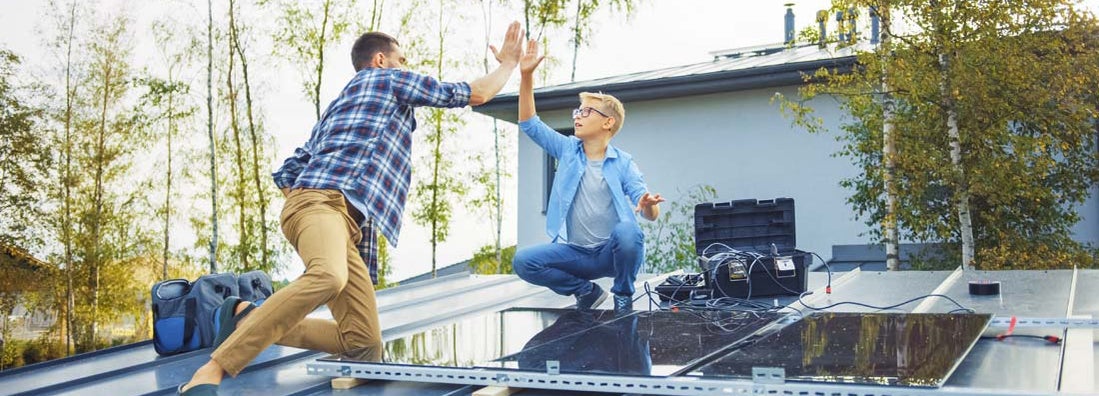Eco-Friendly Things You Can Do for Your Home

Reducing the negative environmental impact of your household is one reason to adopt a few eco-friendly practices. A green home produces less trash and fewer carbon emissions with efficient energy use. Eco-friendly habits help lessen the impact of humans on the globe's finite resources. The best part is that making your home eco-friendly doesn't have to be expensive. Some eco-friendly changes may even help reduce your utility bills, saving you money in the long run. Here are some eco-friendly things you can do for your home:
Free Eco-Friendly Changes
Use the "Cold" Water Washing Machine Setting When Possible
According to Energy Star, 90% of the energy your washing machine uses goes toward heating the water. While it used to be crucial to wash clothing in hot water to activate the detergent's enzymes, modern clothes washing detergent is designed to activate in temperatures as low as 60 degrees.
For certain messes, it may be preferable to wash in hot water. However, using the "cold" setting on your washing machine is just fine for everyday use.
Washing in cold water may also help extend your clothing's lifespan. Materials like silk, 100% cotton, and colorful fabrics tend to shrink and fade when washed in hot water. Stains like sweat and blood may become permanent when washed in hot water as well. Extending the lifespan of your clothing helps you reduce your consumption, making your home more eco-friendly.
Minimize Food Waste
Americans spent nearly 10% of their disposable income on food in 2019 according to the U.S. Department of Agriculture. The average family throws out 250 pounds of food each year. Much of that food waste is due to fears that the food is no longer safe to eat.
One way to minimize the amount of food you toss into the trash is to keep track of what's in your fridge and use it up before it goes bad. Some apps and websites help you "eat what you've already paid for" by finding recipes that use what you have on hand.
Eco-Friendly Upgrades
Replace Incandescent Light Bulbs
LED bulbs use a fraction of the energy of incandescent bulbs and last an average of 50,000 operating hours. New LED bulbs look just like incandescent light bulbs, and you don't have to live with the yellow cast of parking lot lights in your home.
Since LED bulbs don't generate heat, there's less risk of an accidental fire when you replace your older bulbs with modern LEDs. Plus, if you decide to replace fluorescent and mercury vapor lights with LEDs, you reduce the common environmental risks associated with disposal at the end of their life span.
Eliminate Plastic Water Bottles by Installing a Water Filter
The entire life cycle of a plastic bottle of water has environment-ruining implications. It requires more than 17 million barrels of oil to produce a year's worth of plastic water bottles in the United States. Plus, 86% of those bottles become litter or garbage.
Some families have hard water that isn't pleasant to drink straight from the tap, so they may choose to buy bottled water for convenience. Installing a water filter can help you kick the bottled water habit.
Research your options—you may even be able to get a whole house water filter for about the same amount of money as a year's worth of bottled water.
Consider Investing in Your Home's Efficiency
If you would like to increase your home's energy efficiency, connect with your local utility company to learn about the programs they offer to help homeowners save on utility bills. Some utility companies even offer free energy audits to help you identify areas that could use improvement.
Consider replacing older appliances with new EnergyStar certified units. In most homes, the refrigerator uses the most energy. Air conditioners, washing machines, dryers, dishwashers, and stoves are also energy hogs. Older dishwashers use about ten gallons of hot water per cycle, while new models use just three gallons. If you've been limping along with an old appliance, replacing it could help you slash your utility bills and help you create a more eco-friendly home.
Solar panels are another eco-friendly upgrade you can make to your home. Costs vary due to state and local tax breaks as well as grants to help homeowners defray the cost of installation. Whether installing solar panels makes sense for your home depends on your location, how much of your property receives direct sunlight, and your willingness to research the possibilities.
If you decide to add solar panels to your home, be sure to let your homeowners insurance company know. Certain damage to solar panels may also be covered under your homeowners insurance plan, so it's a good idea to check your options and talk with your agent to learn how your homeowners insurance applies to this type of efficiency upgrade.
Reach out to your local trustedchoice.com agent to learn how eco-friendly upgrades to your home may affect your insurance, and what coverages you have for the upgrades you choose. They’re there to support you, answer all of your questions, and ensure that you get coverage for your home on all of the fronts needed. If you don’t have one, you can find an independent insurance agent today.
